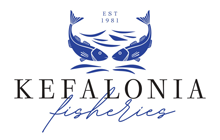What are the commercial names under which I will find Sea Bass and Sea Bream in my country?
Sea Bass and Sea Bream both have their scientific and common names, but also have their commercial names which differ from country to country.
More specifically, Sea Bass:
Scientific name: Dicentrarchus labrax
Common name: European Sea Bass
Greece: Lavraki
Italy: Spigola/ Branzino
France: Bar/ Bar commun/ Loup de mer
Spain: Robalo/ Lubina
Germany: Wolfsbarsch
UK, USA: Branzino/ Bronzini
Sea Bream:
Scientific name: Sparus aurata
Common name: Gilthead Sea Bream
Greece: Tsipoura
Italy: Orata
France: Daurade royale
Spain: Dorada
Germany: Goldbrasse
UK, USA: Dorade
What is the nutritional value of Sea Bass and Sea Bream?
Sea Bass and Sea Bream, both farmed and wild caught, have a very good nutritional profile, being highly recommended as a healthy, nutritious food choice:
Protein content: Sea Bass and Sea Bream are excellent sources of high quality protein, at a content of ~21% protein per gr fillet
Lipid content: Sea Bass and Sea Bream are rich in polyunsaturated fatty acids (the “good fats”) and low in saturated acids (the “bad fats”). In particular they are a good source of omega 3 fatty acids, which are beneficial to the human health.
Vitamins & Minerals: Sea Bass and Sea Bream are an important source of essential vitamins & minerals, namely soluble vitamins A & D, water soluble vitamins B1, B2, B3 & B12, and calcium, phosphorus, zinc and iodine.
| Percentage per 100 gr. fillet | Sea Bream | Sea Bass |
| Protein | 20.4 | 21.2 |
| Lipids | 5.7 | 4.4 |
| of which saturated acids | 1.3 | 1.1 |
| of which polyunsaturated acids | 1.9 | 1.5 |
| ω-3 fatty acids | 1.2 | 1.0 |
| EPA & DHA | 0.8 | 0.7 |
| ω-6 fatty acids | 0.7 | 0.5 |
| Carbohydrates | 0.2 | 0.2 |
| Kcal / 100 gr. fillet | 133 | 125 |
Especially Kefalonia Fisheries Sea Bass and Sea Bream demonstrate an optimal lipid profile as their EPA & DHA content per total gram fat is higher than a lot of other popular farmed fish species (e.g. salmon). This is achieved by raising the fish on higher quality fish feeds which have a higher content of these omega 3 fatty acids.
EPA & DHA are extremely important polyunsaturated fatty acids for the human health, as they are an integral part of our cell membranes, thus playing a very important role in all functions of the human body, and they cannot be composed by the body itself, thus need to be sourced through food, and most typically through seafood consumption. Numerous studies have shown that these are beneficial to the brain and eye health, protect against heart failure, atherosclerosis and thrombosis and relieve depression and fight cognitive decline.
A health claim has been approved by the European Food Safety Authority (EFSA) for farmed sea bass and sea bream which states that:
« Consumption of cultured sea bass and sea bream twice a week, as a rich source of Highly Unsaturated omega3 fatty acids (EPA, DHA) and as part of a healthy life style has been proven to assist in the maintenance of normal cardiac function, maintenance of normal blood pressure and maintenance of normal (fasting) blood triglycerides and blood LDL cholesterol concentrations. »
What certifications and sustainability accreditations do Sea Bass and Sea Bream from Kefalonia Fisheries hold?
Kefalonia Fisheries is committed to sustainable production, the production of seafood in a way that respects the environment, the fish, the employees and the local community, the consumers and the future generations and their right to have access to the same resources we have today. In this context, our entire production of Sea bass and Sea bream is certified according to the ASC Seabass, Seabream & Meagre standard (www.asc-aqua.org), the ASC Chain of Custody standard, the Friend of the Sea standard for sustainable aquaculture (www.friendofthesea.org) as well as the Global G.A.P. standard (www.globalgap.org). These strict standards confirm a responsible, fully organized and constantly monitored operation of the company, that ensures that the environment is not critically impacted and all procedures are in compliance with water, environmental quality parameters and social accountability. Certified sustainable feeds are used throughout the entire production circle and there is absolutely no use of harmful antifoulants, GMOs and growth hormones at any stage of the production.
These, along with our ISO 9001 (quality and safety control procedures) and ISO 14001 (environmental management procedures) ensure that our sea bass and sea bream are healthy, safe and sustainably raised.
Furthermore, Kefalonia Fisheries’ commitment to a healthy planet for the present and the future is expressed through the certification for organic sea bass and sea bream farming. Kefalonia Fisheries was the first fish farm to be certified for organic production in the Mediterranean according to the strict organic standards of Naturland e.V. Today, Kefalonia Fisheries holds both the E.U. certification for organic aquaculture as well as the private standard certification by Naturland e.V.
Are Sea Bass and Sea Bream from Kefalonia Fisheries kosher/halal/gluten free?
Yes they are!
Can I consume Sea Bass and Sea Bream from Kefalonia Fisheries raw?
Yes, you can, as long as you are sure your fish monger/super market take extra good care in maintaining the cold chain unbreeched at all times and you store the fish you purchase under optimal conditions at home before consumption. Kefalonia Fisheries Sea Bass and Sea Bream, because of their premium quality and excellent taste, have been the choice of many chefs and sushi chefs around the globe, for the preparation of crudos, sashimi and other raw fish preparations.
